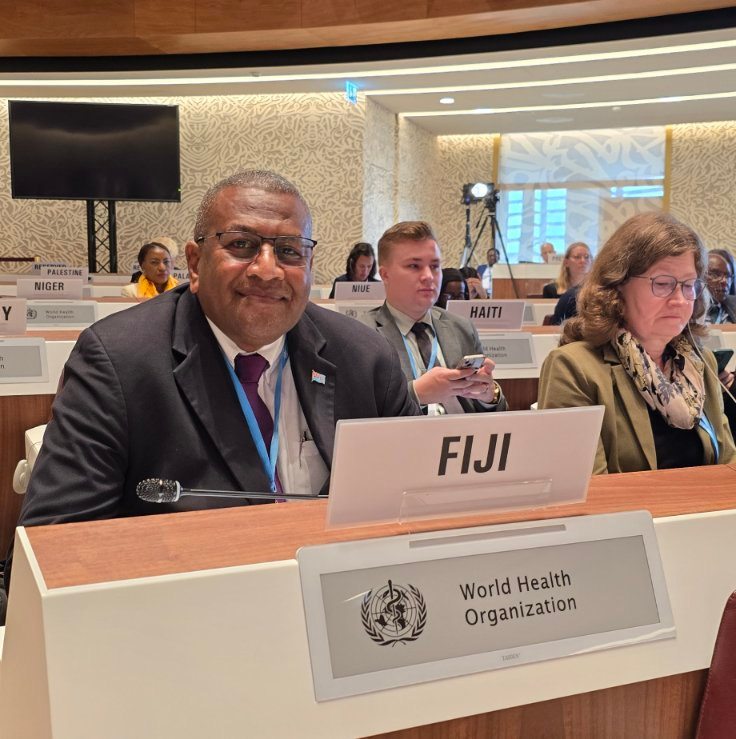AN assistant minister in Government claims some Fijian seasonal workers in Australia are being treated like “Girmitya’s”, raising serious concerns about their working and living conditions.
Assistant Health Minister Penioni Ravunawa said there were some scrupulous employers under the seasonal work program.
“There were also areas of racial inequality noticed,” he said.
Mr Ravunawa said some workers faced difficulties fitting in due to cultural differences and discrimination.
“Others raised concerns about unclear employment contracts, delayed pay, and lack of support from supervisors or labour hire companies.
“They work like Girmitiyas I would say.”
Mr Ravunawa said another concern was the transition back home, with workers struggling to reintegrate into their communities or find stable employment once they returned to Fiji.
“All of these were raised to me by the seasonal workers during a talanoa session.”
Asked if he had discussed the matter with Employment Minister Agni Deo Singh, Mr Ravunawa said he was also in the room while these issues were raised.
“I sat with Mr Singh in the same room during the visit to Melbourne.”
He said the Government remained committed to ensuring the welfare and fair treatment of all Fijian workers under the seasonal workers program.
Questions sent to Mr Singh last Friday have remained unanswered.
However, he had earlier said they were in Australia to listen, understand, and act where necessary.
“Our workers are the heart of this program, and their welfare remains our top priority,” Mr Singh said.
He said they were addressing the remaining challenges through dialogue, collaboration, and accountability, ensuring that the rights and welfare of Fijian workers were protected.
“We recognise the positive steps many employers have taken, and we thank them for their commitment to fair and transparent employment practices,” Mr Singh said.
Mr Singh said their goal was to ensure every Fijian worker under the PALM Scheme felt supported, valued, and protected, while strengthening the partnership with Australia for mutual benefit.
High expectations add strain on Fijian workers
ASSISTANT Health Minister Penioni Ravunawa believes expectations of some families of those working under the seasonal working program in Australia are quite high.
While families eagerly await money sent home by their loved ones under the seasonal workers program, Mr Ravunawa said many failed to realise the physical toll these workers endured abroad.
“Expectations are so high from families here at home, but we fail to understand what they go through,” he said.
He described the reality of life of Fijians working in Australia and New Zealand as far more challenging than imagined.
Mr Ravunawa said many workers battled homesickness and family separation, struggling with emotional strain from being away from their loved ones for months, sometimes years, at a time.
“While earnings are generally higher than in Fiji, many workers struggle with deductions, remittance obligations, or managing savings effectively,” he said.
The minister said workers also faced workplace adjustment issues, particularly in industries such as meat processing, where strict schedules, productivity targets, and demanding work systems were the norm.
“There were also issues raised about their health and well-being.
Some work for long hours, experience physical strain from manual labour, and have limited access to healthcare or mental support.”
Apart from this, Mr Ravunawa said there were reports of overcrowded or inadequate housing, high rental deductions, and limited access to basic amenities.
“Limited understanding of Australian workplace culture, English language challenges, and the lack of awareness of their rights or complaint processes were some of the issues they faced.”
He said they were now considering more stringent measures to ensure money earned was properly used to support families in Fiji, while also providing better welfare support for the workers themselves.
Questions sent to Employment Minister Agni Deo Singh via email last Friday remained unanswered when this edition went to press.
However, he had earlier said in a statement that they would listen, understand, and act where necessary.
“Our workers are the heart of this program, and their welfare remains our top priority,” he said.
He said they were addressing the remaining challenges through dialogue, collaboration, and accountability, ensuring that the rights and welfare of Fijian workers were protected.
“We recognise the positive steps many employers have taken, and we thank them for their commitment to fair and transparent employment practices,” Mr Singh said.
He said their goal was to ensure every Fijian worker under the PALM scheme feels supported, valued, and protected, while strengthening the partnership with Australia for mutual benefit.



